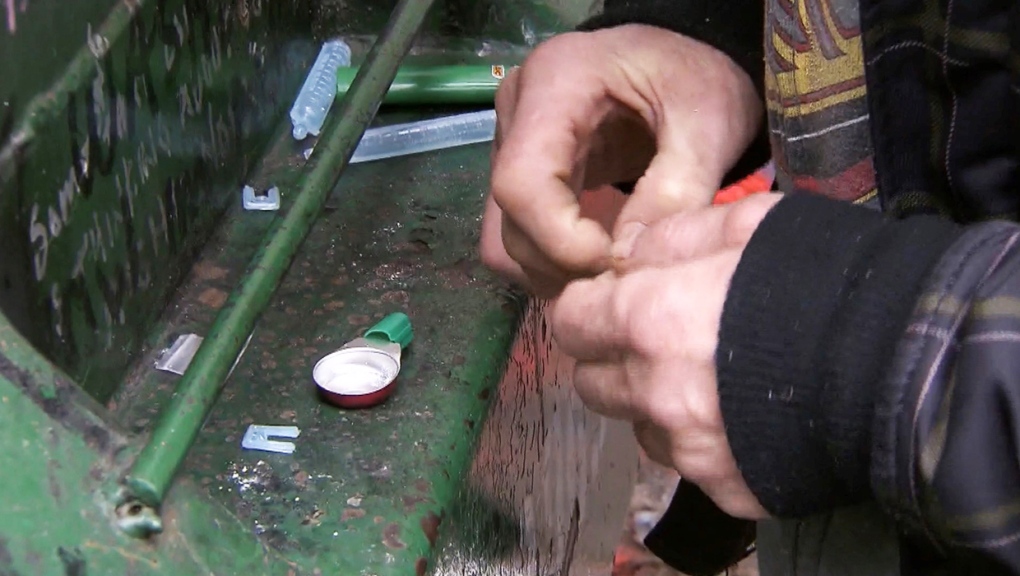Opioid crisis remains a large issue in southern Alberta Indigenous communities
 A naloxone kits can be seen in this undated file photo.
A naloxone kits can be seen in this undated file photo.
There have been over 100 overdose deaths on Piikani Nation since the start of the pandemic and trying to stop it won't be easy.
Last year, 1,623 people died of opioid overdoses in Alberta, nearly triple the number of deaths in 2019.
The opioid crisis in Southern Alberta has been an issue for years and increased ten fold over the course of the pandemic, especially in Indigenous communities.
The members of the Piikani Nation have seen those losses first hand.
"One hundred and ten people have lost their lives since the start of the pandemic," said Lori Vrebosch, one of the founding directors of ‘We Will Recover’. an Indigenous led non-profit covering Lethbridge and area.
In the first three months of 2022, the south zone had 60 drug-related deaths including 27 in February, the highest single number for a month in the region.
 In the first three months of 2022, the south zone had 60 drug-related deaths including 27 in February, the highest single month record for the region.
In the first three months of 2022, the south zone had 60 drug-related deaths including 27 in February, the highest single month record for the region.
"I think that, for years now, we've been witnessing the same trend and the same escalation in the numbers of people who are suffering with substance use disorders, along with those that are succumbing to fatal drug poisonings," Vrebosch said.
This week, Peigan Prevention Counselling Services held overdose prevention information sessions on Piikani Nation.
Sessions like this, along with efforts by groups like ‘We Will Recover’ and the Sage Clan which holds community awareness events to spread information and offer help, are how Vrebosch says the community will hopefully get through to the people who need assistance the most .
"Collaboration and working together is the only way that we're going to get through this and education is of upmost importance," she said.
However, things may have started to look up.
The province announced Wednesday that opioid-related death numbers in Alberta fell seven per cent from March to April.
In addition, only five were deaths reported in the south zone in April, the lowest since September 2020.
In a statement, mental health and addictions minister Mike Ellis acknowledged the community province-wide for its efforts.
"This is important work and we cannot do it alone. Thank you for making a difference. Between the pandemic and the opioid crisis, it has been a difficult few years."
For anyone looking for help or has a loved one who needs assistance, the virtual opioid dependency program offers free help with opioid use.
In addition, you can contact 211 Alberta or visit www.recoveryaccessalberta.ca.
Visit ‘We Will Recover’ on their website for local help or more information.
CTVNews.ca Top Stories

Parliament on the road to an unprecedented confidence crisis, but there are off-ramps
If no political party is willing to say uncle, the drawn-out stalemate in the House of Commons is heading for an unprecedented situation that could amount to a tacit lack of confidence in the government, without anyone in Parliament casting a vote.
Apparent Taylor Swift ticket scam targets hundreds who claim to be out $300K
An apparent scam allegedly targeting roughly four hundred people, many of whom based out of Burlington, Ont., claim to be out approximately $300,000 in total after believing they were purchasing Taylor Swift tickets in Toronto, but never receiving them.
Biden authorizes Ukraine's use of U.S.-supplied long-range missiles for deeper strikes inside Russia
U.S. President Joe Biden has authorized the use of U.S.-supplied long-range missiles by Ukraine to strike even deeper inside Russia, the latest easing of limitations meant to prevent the conflict from further spiraling, according to one U.S. official and three people familiar with the matter.
Dwayne Johnson's US$200 million+ Christmas pic opens to US$34.1 million
Moviegoers were not exactly feeling the Christmas spirit this weekend, or at least what 'Red One' was offering. The big budget, star-driven action comedy with Dwayne Johnson and Chris Evans sold US$34.1 million in tickets in its first weekend in theaters, according to studio estimates Sunday. It easily topped a box office populated mostly by holdovers.
Canadian baby and toddler sleepwear recalled, risk of catching fire: Health Canada
Hundreds of organic baby- and toddler-sized rompers sold by an Ontario-based sustainable clothing company have been recalled over concerns they could catch fire and injure children, according to Health Canada.
Winnipeg man charged with biting police officer during investigation
Winnipeg police have charged a man after an officer was bit during an investigation earlier this year.
Doctors say RFK Jr.'s anti-Ozempic stance perpetuates stigma and misrepresents evidence
Robert F. Kennedy Jr. has pledged to tackle high rates of chronic diseases such as diabetes and obesity as President-elect Donald Trump's pick to lead the US Department of Health and Human Services. They’re goals that many in the public health world find themselves agreeing with — despite fearing what else the infamous anti-vaccine activist may do in the post.
Trump's Pentagon pick paid woman after sex assault allegation but denies wrongdoing, his lawyer says
Pete Hegseth, U.S. president-elect Donald Trump's pick for defense secretary, paid a woman who accused him of sexual assault to head off the threat of a baseless lawsuit, according to Hegseth's lawyer.
Military says more Canadians enlisting as second career amid recruitment struggle
Working on a military truck, within the logistics squadron of CFB Kingston, Private Charlotte Schnubb is elbows deep into an engine with a huge smile on her face.
































